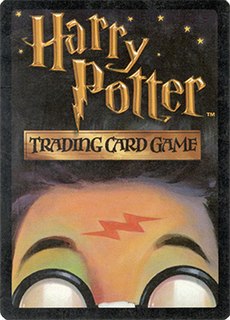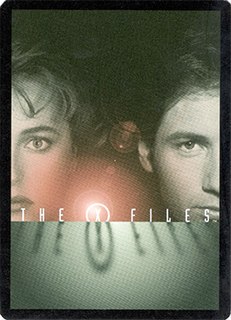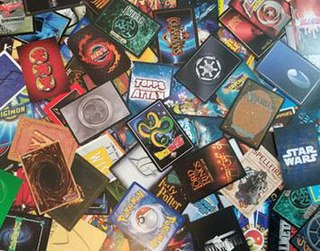
In collectible card games, digital collectible card games and collectible miniature wargames, a booster pack is a sealed package of cards or figurines, designed to add to a player's collection. A box of multiple booster packs is referred to as a booster box.

The Lord of the Rings Trading Card Game is an out-of-print collectible card game produced by Decipher, Inc. Released November 2001, it is based on Peter Jackson's The Lord of the Rings film trilogy and the J. R. R. Tolkien novel on which the films were based. Decipher also had the rights to The Hobbit novel but did not release any cards based on it. In addition to images taken from the films, in 2004 Weta Workshop produced artwork depicting characters and items from the novel absent from the films for use on cards. In 2002, LOTR TCG won the Origins Awards for Best Trading Card Game of 2001 and Best Graphic Presentation of a Card Game 2001. Decipher's license to The Lord of the Rings expired on July 30, 2007, after which all official promotion and distribution of the game had stopped.

The Pokémon Trading Card Game, abbreviated as PTCG or Pokémon TCG, is a collectible card game based on the Pokémon franchise. It was first published in October 1996 by Media Factory in Japan. In the US, it was first published by Wizards of the Coast. In June 2003, Nintendo transferred the publishing rights from both Media Factory and Wizards of the Coast to The Pokémon Company. As of March 2022, the game has sold over 43.2 billion cards worldwide.

A Game of Thrones: The Card Game is an out-of-print collectible card game produced by Fantasy Flight Games. It is based on A Song of Ice and Fire, a series of novels written by George R. R. Martin. The first set was Westeros Edition and was released in August 2002. It has since won two Origins Awards. The game's primary designer is Eric Lang, the lead developer is Nate French, with Damon Stone serving as associate designer.

Vs. System, also written as VS System and abbreviated as VS, is a collectible card game designed by Upper Deck Entertainment (UDE). In the game, players build and play a deck of Vs. System cards in an attempt to win a game against their opponent. It was first published in 2004 and is set in the superhero genre. The game was discontinued by Upper Deck Entertainment in January 2009.

The Yu Yu Hakusho Trading Card Game was first published in 2003 by Score Entertainment, and is based on the anime and manga series YuYu Hakusho. It is a two-player tournament-styled collectible card game; each player uses a deck of forty-four or more cards that is headed by a team of four character cards. The game was discontinued in 2005.

The Harry Potter Trading Card Game is an out-of-print collectible card game based in the world of J. K. Rowling's Harry Potter novels. Created by Wizards of the Coast in August 2001, the game was designed to compete with the Yu-Gi-Oh!, Pokémon and Magic: The Gathering card games. Its release was timed to coincide with the theatrical premiere of the first film in the series. The game was praised for the way it immersed children in the Harry Potter universe. At one point the game was the second best selling toy in the United States; however, it is now out of print.

Dragon Ball Z Trading Card Game is an out-of-print trading card game based on the Dragon Ball series created by Akira Toriyama. The game was produced by Score Entertainment and uses screen captures of the anime to attempt to recreate the famous events and battles seen in the anime. Score then sold the rights to Panini which eventually ceased publishing.

The World of Warcraft Trading Card Game is an out-of-print collectible card game based on Blizzard Entertainment's MMORPG, World of Warcraft. The game was announced by Upper Deck Entertainment on August 18, 2005 and released on October 25, 2006. Players can play against each other one-on-one, or can join others in order to defeat dungeon/raid "bosses" based on those in the MMORPG. In March 2010, Upper Deck lost the license from Blizzard Entertainment. The license was acquired by Cryptozoic Entertainment later in the month, with the company announcing that planned card sets would be released.

The Pirates of the Caribbean Trading Card Game is an out-of-print collectible card game based on the two Disney films Pirates of the Caribbean: The Curse of the Black Pearl and Pirates of the Caribbean: Dead Man's Chest. Upper Deck Entertainment launched this title in June 2006 to roughly correspond to the release of the second film but canceled due to lack of interest.

The Pokémon Trading Figure Game is a collectible miniatures game similar to HeroClix. It was designed by Pokémon USA and based on Satoshi Tajiri's Pokémon media franchise.

The X-Files Collectible Card Game is an out-of-print collectible card game based on The X-Files fictional universe. It was developed by NXT Games and published by the US Playing Card Company (USPCC).
Star Wars PocketModel Trading Card Game is an out-of-print tabletop game manufactured by WizKids, Inc. that debuted in 2007, based on the Star Wars universe. The game was designed by Mike Elliott and Ethan Pasternack.

Chaotic is an out-of-print Danish collectible card game brought to the United States by Chaotic USA and 4Kids Entertainment, and distributed by TC Digital Games. It was released along with the open beta version of the online game on October 24, 2007. The card game is also featured in the animated series of the same name. As of 2014, the website is currently closed and the cards are no longer in production.
Released by Wizards of the Coast in 2000, the X-Men Trading Card Game was a collectible card game (CCG) designed to coincide with the popularity of the film X-Men, the first of the X-Men film series. This set had featured character art similar to that of film and included characters who did not appear in the movie. It was released in July 2000.
The Dragon Ball Collectible Card Game is a collectible card game based on the Dragon Ball franchise, first published by Bandai on July 18, 2008. Bandai relaunched the card game on July 28, 2017.

A collectible card game (CCG), also called a trading card game (TCG) among other names, is a type of card game that mixes strategic deck building elements with features of trading cards, introduced with Magic: The Gathering in 1993.

The My Little Pony Collectible Card Game is a two-player collectible card game based on the animated television series My Little Pony: Friendship Is Magic. It is produced by Enterplay LLC under license from Hasbro, and follows from Enterplay's previous work to produce a trading card series based on the same show.

The Final Fantasy trading card game, often abbreviated as Final Fantasy TCG or FF-TCG, is a trading card game by Square Enix and Hobby Japan. The first iteration released in Japan in 2011 but never released outside Japan and was discontinued in order to release a second iteration worldwide in October 2016.
















